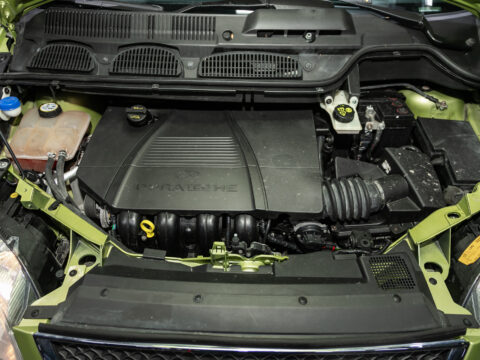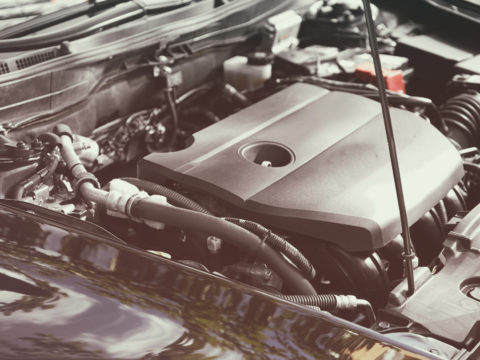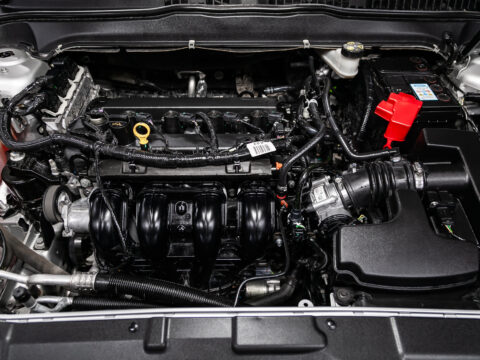Dealing with engine problems is one of the worst situations. Whether you’re shopping for a new truck or trying to diagnose the one already in your garage, it’s crucial to know about common Chevy 6.6 gas problems.
In this post, we’ll go over some of the main issues along with potential solutions.
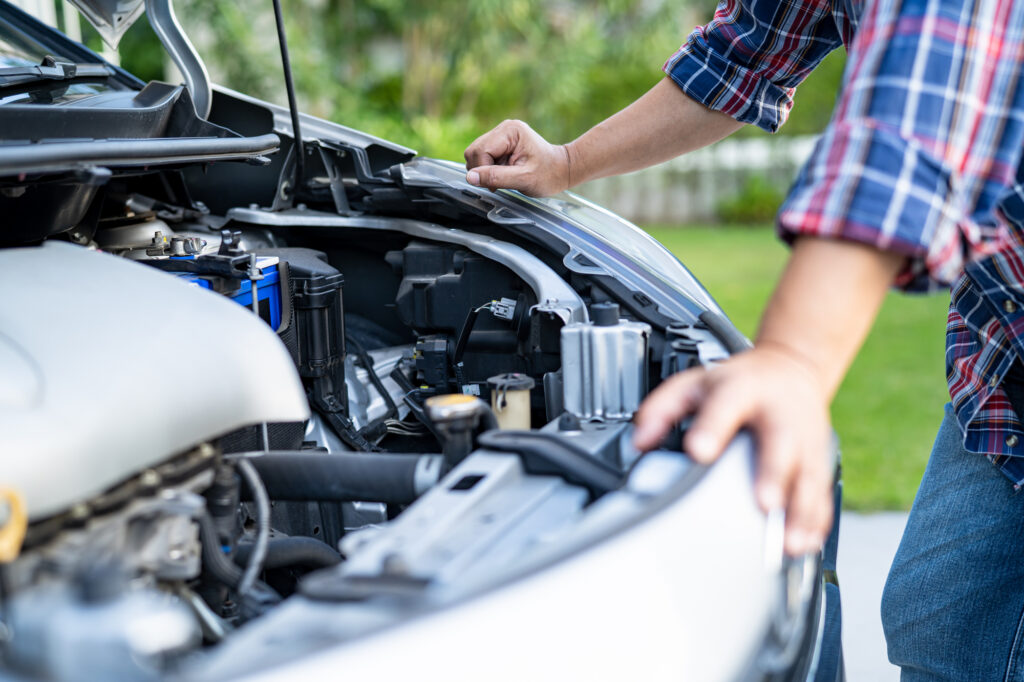
Contents
About the Chevy 6.6 Gas Engine
To many Chevy fans, there’s nothing like cranking on the ignition and hearing a V8 beast come to life. The Chevy 6.6 gas engine is one of the iconic powerhouses from the longtime brand, featured on various heavy-duty Chevrolet trucks.
There are some common Chevy 6.6 gas problems, such as a knocking noise, random ticking, lack of power, the six-speed transmission, poor fuel economy, and lackluster acceleration.
As the name suggests, this engine has a 6.6L displacement. And like many large Chevy engines, it uses a V8 design with two banks of four cylinders placed in a V arrangement, powering a single crankshaft.
You can find the Chevy 6.6L engine on an assortment of Chevrolet Silverado and GMC Sierra Heavy Duty trucks. It has a compression ratio of 10.8:1 and typically produces over 400 horsepower and over 450 lb-ft of torque.
The Chevy 6.6 gas engine uses a cast iron block with aluminum heads and a forged steel crankshaft. This large, durable engine features many other high-strength components as well.
Overall, this is known as a well-designed, reliable engine. But prospective and current owners should be aware of the common Chevy 6.6 gas problems. Let’s go through these in some detail.
Common Problems With the Chevy 6.6 Gas Engine
Most Chevy 6.6 gasoline engine owners don’t have much to worry about. But that’s not always the case. Sometimes problems occur, and identifying the issue is the first step toward getting the engine fixed or avoiding worse damage.
Five common Chevy 6.6 gas problems include:
1. Knocking Sound at Idle
2. Random Ticking Noise
3. Insufficient Power
4. Only Six-Speed Transmission
5. Poor Fuel Economy
6. Lackluster Acceleration
1. Knocking Sound at Idle
The Chevy 6.6 gas engine has some reports of a knocking sound that is most prevalent when idling.
In certain cases, this knocking sound can be a sign of bad lifters or valve springs. And some mechanics have also pointed to failed engine bearings.
If you hear this knocking sound when your truck with a Chevy 6.6 engine is idling, it is worth taking it to the shop to see if they can fix the issue. You want to get ahead of the problem rather than wait for it to worsen, especially if you still have warranty coverage.
Another way to solve a knocking sound in the Chevy 6.6 engine is to change the oil. Some people report that after completing an oil change, the knocking noise goes down significantly. Using a high-quality, name-brand synthetic oil can help alleviate this problem and extend the life of your truck.
2. Random Ticking Noise
Along the same lines as the knocking noise at idle is a random ticking noise. This problem usually isn’t as consistent as the knocking noise and comes with a lighter tick rather than a knock.
The ticking noise can sometimes be as simple as a bad pulley. Although, in certain cases, it can point to the same issues as the knocking noise, including bad lifters or valve springs. These can be fatal issues, especially if left untreated for many miles.
Like the knocking noise, it’s best to take care of the problem before it gets worse and causes more internal damage to your engine.
To solve a random ticking noise on a Chevy 6.6 engine, follow the same path as the knocking noise. Take it in right away if it’s under warranty. Or change the oil and use high-quality synthetic. And if that doesn’t fix it, take it to a specialist who can help.
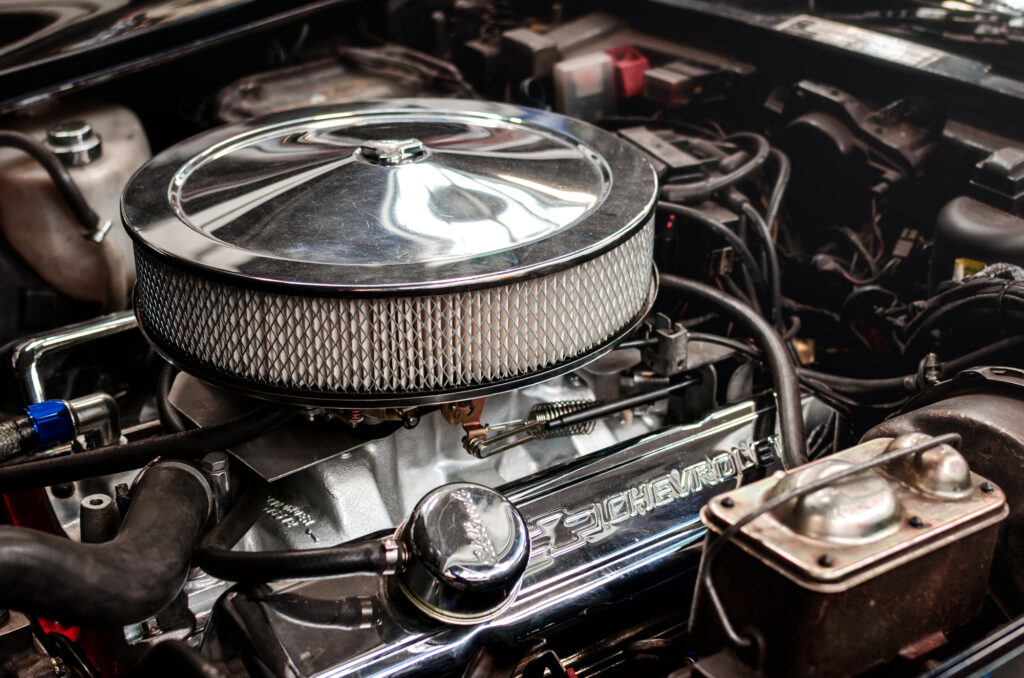
3. Insufficient Power
Another common Chevy 6.6 gas problem is that some people report that they feel it simply doesn’t have enough power. The gasoline version is known to have less torque than the diesel version.
This issue can cause underwhelming performance when towing or going up steep hills. It can also be downright disappointing when hauling heavy cargo that the heavy-duty truck should be able to tackle without breaking a sweat.
In general, the Chevy 6.6 engine is powerful. But if you want to get a little more out of it, you can consider upgrading some components to increase its output. High-flow intake or exhaust can help. So can improving the spark plugs or ignition system items.
Getting the engine control unit (ECU) tuned by a reputable party can also squeeze power out of it. This tuning can also give you more customization on things like shift points and general engine behavior.
4. Only Six-Speed Transmission
Not that long ago, a six-speed transmission was considered a lot for a large truck. But many of today’s trucks come with an eight or even a ten-speed transmission. But the Chevy 6.6 engine comes with a six-speed transmission.
This fact can make it challenging to find the right gear and not allow for smooth acceleration. This issue is a mild yet common Chevy 6.6 gas problem that you shouldn’t lose too much sleep over.
There’s not too much that you can do to solve this issue. Be aware of the six-speed before you purchase one.
5. Poor Fuel Economy
The Chevy 6.6 engine is reported to have poor fuel economy. While you can’t ever expect a large V8 engine to get superb mileage, the 6.6 can be even worse than other Chevy engines.
This lack of fuel efficiency is because some Chevy 6.6 engines don’t use the advanced fuel-saving technologies found on other Chevy motors. Active Fuel Management and Auto Stop-Start are two of the most common missing from the Chevy 6.6.
If you want the most fuel economy, it will help to avoid excessive acceleration and braking. By going easy on both pedals, you can conserve the truck’s momentum and avoid having to waste precious fuel.
Keeping the engine in good maintenance with regular oil changes and replacing the spark plugs when necessary can also help improve fuel economy.
6. Lackluster Acceleration
Finally, one of the other common Chevy 6.6 gas problems is lackluster acceleration. Many people select a gasoline engine instead of a diesel because gasoline engines usually get better acceleration.
But some Chevy 6.6 owners report the acceleration feels less than ideal. And when you have to haul around a lot of gear or heavy equipment, this can be a significant issue.
To improve acceleration, consider some performance-enhancing modifications. You can get different intake or exhaust systems, tune the ECU, or make other changes, such as higher-end spark plugs or ignition system components.
Reducing the weight you carry can also help with acceleration. Don’t keep a bunch of stuff in the truck you don’t need. Even oversized tires and wheels can impact acceleration ability.
6.6 Gas vs. 6.6 Diesel, Which Is Better?
If you are in the market for a new Chevy truck with a 6.6 engine, you’ll have to pick between the gasoline or the diesel versions. There are pros and cons to each type.
Chevy trucks with 6.6 gasoline engines are usually sold at a lower price when compared to diesel. They’ll also commonly have better fuel economy and increased acceleration.
On the other hand, the 6.6 diesel has better longevity, as is normal with diesel engines, due to the lack of a constant electronic ignition system. The combustion in a diesel engine occurs from compression alone, not from an introduced spark like in a gasoline engine.
The diesel will also have more torque but slightly slower acceleration. It’s a great workhorse option that can handle the heaviest cargo you can throw at it.
So, Is the Chevy 6.6 Gas a Good Engine?
Many reports show that the Chevy 6.6 gas is a good engine. But in rare cases, there have been reports of a knocking sound at idle, random ticking noises, and weak performance and acceleration.
Its six-speed transmission is suitable for most needs, but other engines come with a smoother eight or ten-speed transmission.
And even though most people don’t buy a large V8 engine for fuel economy, the Chevy 6.6 fails to use standard technology to decrease the consumption rate for the truck’s tank and your wallet.

